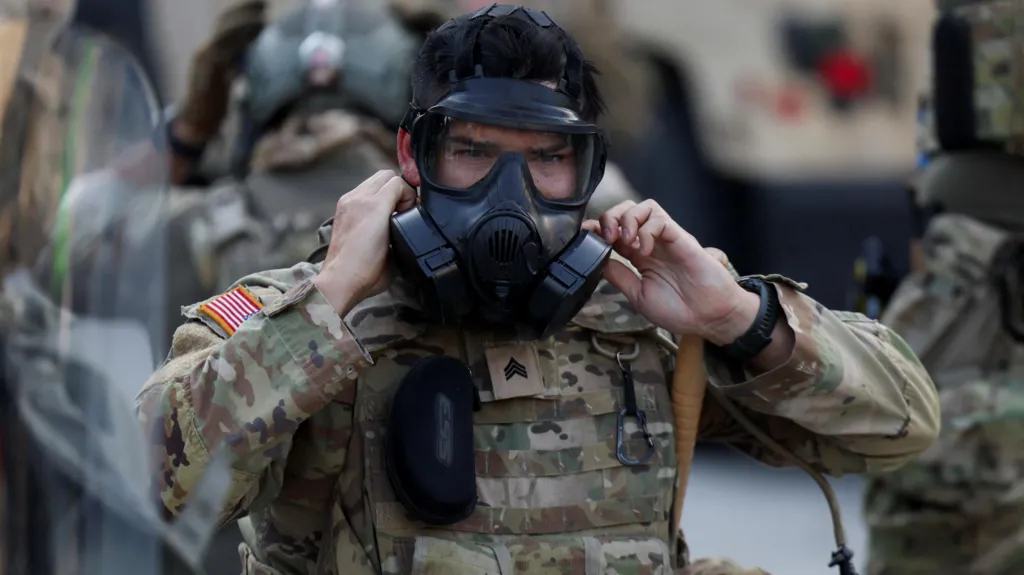In a dramatic legal showdown between state and federal authority, a federal appeals court has temporarily blocked a lower court’s order that required the Trump administration to return control of California’s National Guard to Governor Gavin Newsom. The case stems from the controversial deployment of thousands of National Guard troops and U.S. Marines to Los Angeles, ordered by former President Donald Trump in response to massive protests over his hardline immigration policies.
Israel Strikes Iran’s Nuclear Sites: Trump Praises Attack as Middle East Tensions Soar
The deployment, which Trump said was necessary to “prevent the city from burning,” triggered immediate backlash from California leaders, who called the move a blatant violation of state sovereignty and a dangerous precedent for military involvement in domestic affairs.
Trump Deploys Troops Amid Protests
The crisis began when Trump dispatched 4,000 National Guard troops and 700 Marines to Los Angeles to support Immigration and Customs Enforcement (ICE) agents carrying out controversial raids across the city. The protests, sparked by what many viewed as inhumane immigration enforcement, led to hundreds of arrests and temporary freeway closures.
Trump defended his decision as an effort to restore law and order, citing the large-scale civil unrest as justification. However, Governor Newsom and other California officials slammed the move as unconstitutional and inflammatory.
Governor Newsom: “Military Belongs on the Battlefield, Not Our Streets”
Governor Gavin Newsom challenged the deployment in court, arguing that military occupation of city streets would only heighten tensions. After a federal judge initially ruled in Newsom’s favor, ordering the Trump administration to relinquish control of the state’s National Guard, an appeals court swiftly intervened, putting the ruling on hold and allowing the troops to remain in Los Angeles — for now.
On social media, Newsom celebrated the lower court’s ruling:
“The court confirmed what we all know — the military belongs on the battlefield, not on the streets of our cities.”
The Legal Question: Who Controls the National Guard?
Under normal conditions, National Guard units are under the control of their state governors, who activate them for emergencies like wildfires, floods, and public unrest. But the Trump administration invoked a rarely used federal law that allows the President to federalize the Guard during cases of “insurrection” or national emergency.
In a fiery opinion, U.S. District Judge Charles Breyer ruled that Trump had overstepped his constitutional limits.
“He did not follow the law,” Breyer wrote. “His actions were illegal… and he must return control of the California National Guard to the Governor.”
However, the appeals court quickly issued a stay, pending a full hearing scheduled for next Tuesday, keeping the soldiers under federal control in the interim.
DOJ Defends Trump’s Actions: “Commander-in-Chief Powers Apply”
The Department of Justice defended Trump’s decision, arguing that the President, as Commander-in-Chief, had full authority to deploy troops to protect federal interests. DOJ attorney Brett Shumet told the court:
“Governor Newsom was fully informed of the order. He objected — but the President holds constitutional authority over the armed forces.”
Judge Breyer pushed back, holding up a copy of the Constitution in court and stating,
“The President is not the Commander-in-Chief of the National Guard unless federalized properly. His powers are not absolute.”
A Rare and Risky Move
Historically, it’s uncommon for Presidents to bypass governors and deploy the National Guard without consent. The last notable case was in the 1950s, when President Dwight D. Eisenhower sent troops to enforce school desegregation.
This case marks the first significant domestic deployment of the Guard without a governor’s approval in decades — and has reignited national debate over executive overreach and the proper role of the military in domestic policing.
Is Protest “Rebellion”?
At the heart of the case is whether the protests in Los Angeles qualify as a “rebellion.” Trump’s team insisted they did, citing mass disruptions and threats to federal officers. But California’s lawsuit argued the opposite, saying the protests — though loud and disruptive — were a legitimate expression of free speech, not an insurrection.
“There has not been rebellion or insurrection at any point,” the filing read. “This is protest — not war.”
High Stakes for American Democracy
As legal proceedings continue, the nation awaits the appeals court’s next move. The outcome could set a critical precedent for the limits of federal power, especially regarding the use of the military on American soil without state approval.
The debate also touches broader constitutional issues: how far can a President go in claiming emergency powers, and at what point do courts step in to check those powers?
With the next court hearing set for Tuesday, the future of the California National Guard’s deployment — and the balance of power between state and federal governments — hangs in the balance.
Meta Description:
An appeals court temporarily blocks Trump’s controversial deployment of National Guard troops to Los Angeles, sparking a legal battle over state and federal authority.
SEO Keywords:
Trump National Guard California, Gavin Newsom Trump, National Guard deployment Los Angeles, federal vs state powers, Trump immigration protests, appeals court Trump troops, Breyer National Guard ruling, military use in domestic protests, state sovereignty vs federal authority

